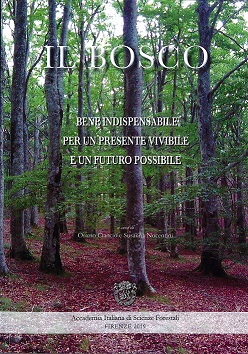
Il bosco: bene indispensabile per un presente vivibile e un futuro possibile / a cura di Orazio Ciancio e Susanna Nocentini. – Firenze : Accademia Italiana di Scienze Forestali, 2019. – 277 p.
ISBN 978-88-87553-25-3
DOI 10.4129/bosco.2019
Riassunto
Questo volume raccoglie le sintesi di quanto presentato e discusso nel IV Congresso Nazionale di Selvicoltura: il bosco, bene indispensabile per un presente vivibile e un futuro possibile, organizzato a Torino dal 5 al 9 novembre 2018 dall’Accademia Italiana di Scienze Forestali in collaborazione con la Regione Piemonte e l’Università degli Studi di Torino. L’evento è stato un forum dove i rappresentanti governativi e delle Regioni, quelli delle università e degli istituti di ricerca, della società civile e del settore pubblico e privato forestale e ambientale, hanno potuto scambiare le loro esperienze al fine di formulare linee guida e conseguenti raccomandazioni a livello regionale e nazionale. L’obiettivo è stato quello di pervenire a sintesi conoscitive, scientifiche e tecniche innovative, proiettate al futuro e alla piena implementazione del concetto di gestione forestale sostenibile attraverso risposte scientificamente fondate e percorribili sul piano tecnico-programmatico. Nel volume sono riportate: la relazione introduttiva tenuta da Orazio Ciancio dal titolo Storia, scienza, sapere. Le tre S della conoscenza in campo forestale, le sintesi dei lavori presentati nelle 14 Sessioni tematiche (1. Ecologia e genetica per la gestione sostenibile degli ecosistemi forestali; 2. Selvicoltura, biodiversità e fauna; 3. Selvicoltura e tutela del territorio forestale; 4. Selvicoltura, paesaggio e impatti sui cambiamenti dell’uso del suolo; 5. Boschi urbani e periurbani e utilità ecosistemiche; 6. Selvicoltura e produzioni forestali e silvopastorali; 7. Selvicoltura ed economia forestale; 8. Innovazione e qualificazione del lavoro in foresta; 9. Monitoraggio e pianificazione forestale; 10. Arboricoltura da legno ed agroselvicoltura; 11, Ricerca, innovazione e prospettive nella filiera foresta-legno; 12. Selvicoltura e incendi; 13. Protezione delle foreste; 14. Politiche e istituzioni forestali),le sintesi delle discussioni che hanno animato le 6 Tavole rotonde (1. La collaborazione interistituzionale nel settore forestale; 2. Nuove teorie in selvicoltura; 3. Gestione forestale e comunicazione; 4. Il D.lgs. 3 aprile 2018, n. 34 «Testo unico in materia di foreste e filiere forestali»; 5. Gestione forestale sostenibile nelle aree protette: parchi e riserve; 6. Le Scienze Forestali tra università e lavoro) e la Mozione finale del Congresso.
Parole chiave: Selvicoltura, Ecologia forestale, Genetica forestale, biodiversità, paesaggio, boschi urbani, produzioni forestali, economia forestale, lavoro in foresta, monitoraggio, pianificazione, arboricoltura da legno, agroselvicoltura, filiera foresta-legno, incendi, protezione delle foreste, politiche e istituzioni forestali, nuove teorie, comunicazione, legislazione forestale, parchi e aree protette, formazione forestale.
Summary
The forest: a fundamental asset for making the present livable and the future possible
This book summarizes the main points presented and discussed during the IV National Congress of Silviculture: “The forest: a fundamental asset for making the present livable and the future possible” (Turin, 5-9 November 2018), organized by the Italian Academy of Forest Sciences with the collaboration of the Piemonte Region and the University of Turin. The event brought together representatives from Universities and research institutes, State and Regional institutions, forestry and environmental organizations, private and public forestry initiatives, with the aim of formulating innovative scientific and technical proposals for the full implementation of the concept of sustainable forest management. Contents of the book are: the introductory lecture by O. Ciancio, the synthesis of the 14 Thematic Sessions (1. Ecology and genetics for sustainable management of forest ecosystems; 2. Silviculture, biodiversity and fauna; 3. Silviculture and forest land protection; 4. Silviculture, landscape and impact on land use changes; 5. Urban and periurban forests and ecosystem services; 6. Silviculture and forest and silvopastoral productions; 7. Silviculture and forest economics; 8. Innovation in forest operations; 9. Forest monitoring and planning; 10. Timber/wood plantations and agroforestry; 11. Research, innovation and perspectives in the forest-wood chain; 12. Silviculture and forest fires; 13. Forest protection; 14. Forest policies and institutions), the synthesis of the discussions of the 6 Round tables (1. Inter-institutional collaboration in the forest sector; 2. New theories in silviculture; 3. Forest management and communication; 4. The Act No. 34 of 3rd April 2018, i.e. the Consolidated Text on forests and forest industry; 5. Sustainable forest management in protected areas: parks and nature reserves; 6. Forest sciences between University and jobs) and the Final Motion of the Congress.
Key words: Silviculture, forest ecology, genetics, biodiversity, landscape, urban forests, forest production, forest economics, forest operations, forest monitoring and planning, arboriculture for wood production, agro-forestry, forest-wood chain, forest fires, forest protection, forest policies and institutions, new theories, communication, forest legislation, protected areas, forestry education
